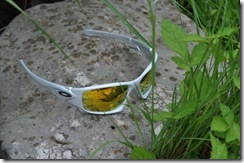Sunglasses are Essential for Eye Health — But the Wrong Pair Can Do More Harm than Good
 I am surprised at the number of people who think discomfort is the only negative consequence of not wearing sunglasses. Like skin, eyes are susceptible to sun damage and need to be protected against harmful ultraviolet rays. Overexposure to UV rays is linked to the development of cataracts, macular degeneration (an incurable eye disease resulting in blindness), and growths on the eye called pterygiums.
I am surprised at the number of people who think discomfort is the only negative consequence of not wearing sunglasses. Like skin, eyes are susceptible to sun damage and need to be protected against harmful ultraviolet rays. Overexposure to UV rays is linked to the development of cataracts, macular degeneration (an incurable eye disease resulting in blindness), and growths on the eye called pterygiums.
Sunglasses also guard against wrinkles by keeping us from squinting and protecting the delicate skin around the eyes from the aging effects of UV light.
But not all sunglasses are created equal. In fact, wearing poor-quality or unrated sunglasses can be worse than wearing none at all because the darkened lenses allow the pupils to dilate while doing nothing to block UV rays.
Price should not be used to gauge the level of protection a pair of sunglasses provides. Lens color is not a reliable indicator, either. The most important thing to look for when shopping for shades is an Eye Protection Factor rating of 9 or 10, or a “100% UV (ABC)” label. (At a minimum, all types of sunglasses, including prescription and non-prescription glasses, should absorb UV-A and UV-B rays, and be labeled as such.) EPF is to sunglasses what SPF is to sunscreen, though EPF is ranked on a scale from 1 to 10, with 10 providing 100 percent blockage of UV light. The “100% UV” ranking is another valid indicator of complete protection against UV rays.
Sunglasses come with ordinary tinted lenses or polarized lenses. Tinted lenses reduce brightness, and provided they carry the recommended UV rating, they will protect your eyes from sun damage. Polarized lenses go a step further and eliminate glare. As light passes through a polarized lens, the polarized film channels the rays to travel in the same direction, sort of like window blinds can be used to direct light. I highly recommend polarized sunglasses across the board, but they are especially handy when participating in watersports because they eliminate the glare off the water, and for driving because they eliminate distractions like heat waves and light reflecting off objects and other vehicles.
Typical gray lenses are suitable for general use. Amber or yellow lenses are best for evening. Light green lenses can help your golf game.
There are plenty of quality brands to choose from, but generally speaking, you can’t go wrong with Maui Jim or Oakley.
Dr. Jeff Pinkerton
I care for you.
Comments are closed.

[…] be very sensitive to light, we send you home with special sunglasses (or you can bring your own quality pair with UV protection). Some patients experience blurred vision after dilation and may have difficulty reading fine print […]
[…] Protect Your Eyes at Work and at Play […]
[…] eye health for life — if you know what to look for. Though a “100% UV” label is usually a reliable safety indicator, mislabeling and fraud […]
[…] Of course, there are factors besides looks to keep in mind when choosing sunglasses, which I discussed in a previous iCare health bulletin. […]
[…] Whatever your style, Insight Eyecare has you covered. Of course, there are other factors to keep in mind when shopping for sunglasses, which we discussed in a previous post. […]